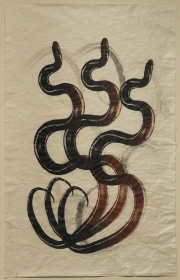Gampi
Description
Paper produced from the short bast fibers obtained from the shrub, Wikstroemia canescens, native to the mountainous regions of Japan. Gampi is a fine, fibrous paper made on a papermaking screen covered with a waterproof Silk cloth. This results in the paper having a silk-like, woven appearance. While gampi is transparent, smooth, and strong, it has poor dimensional stability. Gampi is used as Tracing paper and as interleaves for beating Gold, but not for linings.
Synonyms and Related Terms
Wikstroemia canescens; bird-skin paper; gambi;
Other Properties
Fiber width = 6-16 microns; Striation are fine and well-spaced. Parenchymal cells are rectangular with few structure.
Additional Information
T.Collings, D. Miller, 'The Identification of Oriental Paper Fibers' The Paper Conservator, vol 3, 1978.
Additional Images
Authority
- Matt Roberts, Don Etherington, Bookbinding and the Conservation of Books: a Dictionary of Descriptive Terminology, U.S. Government Printing Office, Washington DC, 1982 Comment: Wikstroemia canescens
- Book and Paper Group, Paper Conservation Catalog, AIC, 1984, 1989
- The Dictionary of Paper, American Paper Institute, New York, Fourth Edition, 1980
- Bernard Toale, The Art of Papermaking, Davis Publications, Portland OR, 1983
- Silvie Turner, Which Paper?, Design Press, New York, 1991
- Art and Architecture Thesaurus Online, http://www.getty.edu/research/tools/vocabulary/aat/, J. Paul Getty Trust, Los Angeles, 2000
- The Dictionary of Art, Grove's Dictionaries Inc., New York, 1996 Comment: "Prints"




